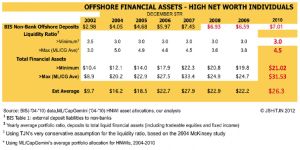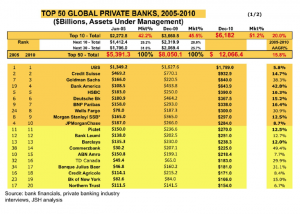OCC Circles Back to JP Morgan’s Money Laundering
When I first read that the government was going to investigate JP Morgan Chase ∂for money laundering, I thought this was another case where the government continued to give wrist slaps–in the form of softball fines–to banks for behavior that never really changed. And to some degree that will be the case. After all, little more than a year ago Treasury’s Office of Foreign Assets Control accused Jamie Dimon’s company of a whole slew of things, including sending Iran a ton (literally) of gold bullion. And in spite of the fact OFAC said JPMC substantially cooperated with their investigation so they could give it a softball fine, the settlement actually made it clear they had done anything but. (Though the softball fine may have also had something to do with what I suspect was cooperation on setting up the Scary Iran Plot.)
So here we are again, investigating JPMC for money laundering. Again.
But I wonder whether this doesn’t reflect an effort on the part of the Office of Comptroller and Currency, which the NYT says is leading the probe, to improve on its past willful neglect in this area.
Regulators, led by the Office of the Comptroller of the Currency, are close to taking action against JPMorgan Chase for insufficient safeguards, the officials said. The agency is also scrutinizing several other Wall Street giants, including Bank of America.
The comptroller’s office could issue a cease-and-desist order to JPMorgan in coming months, an action that would force the bank to plug any gaps in oversight, according to several people knowledgeable about the matter. But the agency, which oversees the nation’s biggest banks, has not yet completed its case. JPMorgan is in the spotlight partly because federal authorities accused the bank last year of transferring money in violation of United States sanctions against Cuba and Iran.
Since OFAC let JPMC off with a wrist slap last year, the OCC has gotten a new confirmed head, Thomas Curry, from FDIC, and gotten rid of a corrupt Chief Counsel, Julie Williams. OCC also got hammered in Carl Levin’s report on HSBC’s money laundering.
To carry out [its oversight] mission, in the words of the OCC, it conducts “regular examinations to ensure that institutions under our supervision operate safely and soundly and in compliance with laws and regulations,” including AML laws. However, the HSBC case history, like the Riggs Bank case history examined by this Subcommittee eight years ago, provides evidence that the current OCC examination system has tolerated severe AML deficiencies for years and given banks great leeway to address targeted AML problems without ensuring the effectiveness of their AML program as a whole. As a result, the current OCC examination process has allowed AML issues to accumulate into a massive problem before an OCC enforcement action is taken.



